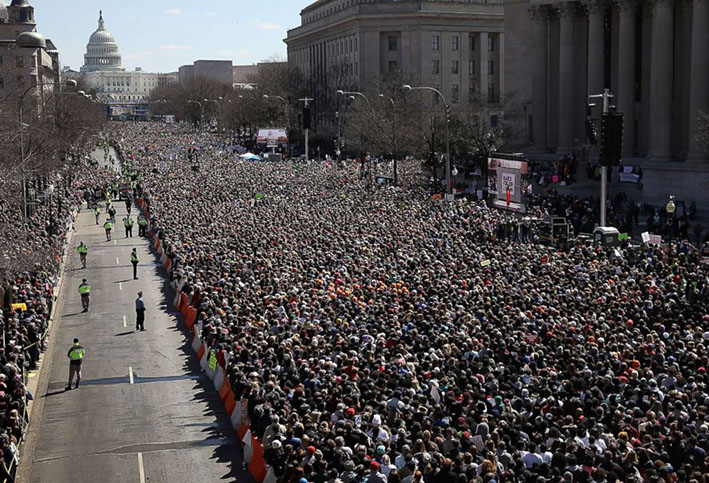WASHINGTON (Reuters) – Chanting “never again,” hundreds of thousands of young Americans and their supporters answered a call to action from survivors of last month’s Florida high school massacre and rallied across the country on Saturday to demand tighter gun laws.
In some of the biggest US youth demonstrations for decades, protesters in cities nationwide called on lawmakers and President Donald Trump to confront the issue. Voter registration activists fanned out in the crowds, signing up thousands of the nation’s newest voters.
At the largest March For Our Lives protest, demonstrators jammed Washington’s Pennsylvania Avenue where they listened to speeches from survivors of the Feb. 14 mass shooting at Marjory Stoneman Douglas High School in Parkland, Florida.
There were sobs as one teenage survivor, Emma Gonzalez, read the names of the 17 victims and then stood in silence. Tears ran down her cheeks as she stared out over the crowd for the rest of a speech that lasted six minutes and 20 seconds, the time it took for the gunman to slaughter them.
The massive March For Our Lives rallies aimed to break legislative gridlock that has long stymied efforts to increase restrictions on firearms sales in a nation where mass shootings like the one in Parkland have become frighteningly common.
“Politicians: either represent the people or get out. Stand with us or beware, the voters are coming,” Cameron Kasky, a 17-year-old junior at Marjory Stoneman Douglas, told the crowd.
Another survivor, David Hogg, said it was a new day.
“We’re going to make sure the best people get in our elections to run not as politicians, but as Americans. Because this – this – is not cutting it,” he said, pointing at the white-domed Capitol behind the stage.
Youthful marchers filled streets in cities including Atlanta, Baltimore, Boston, Chicago, Los Angeles, Miami, Minneapolis, New York, San Diego and St. Louis.
More than 800 demonstrations were scheduled in the United States and abroad, according to coordinators, with events as far afield as London, Mauritius, Stockholm and Sydney.
Underlining sharp differences among the American public over the issue, counter-demonstrators and supporters of gun rights were also in evidence in many US cities.
Organizers of the anti-gun rallies want Congress, many of whose members are up for re-election in November, to ban the sale of assault weapons like the one used in the Florida rampage and to tighten background checks for gun buyers.
On the other side of the debate, gun rights advocates cite constitutional guarantees of the right to bear arms.
“All they’re doing is asking the government to take their liberty away from them without due process,” Brandon Howard, a 42-year-old Trump supporter, said of the protesters in the capital. He had a sign saying: “Keep your hands off my guns.”
Wearing a red “Make America Great Again” sweatshirt, 16-year-old Connor Humphrey of San Luis Obispo, California, said: “Guns don’t kill people. People kill people.”
Humphrey, who was visiting Washington with his family for spring break, said he owns guns for target shooting and hunting and uses them responsibly. His school had a lockdown exercise last week.
“I think teachers should have guns,” he said, echoing a proposal made by Trump after the Parkland killings.
In New York City, a handful of counter-demonstrators waved placards with messages such as “Keep America Armed” and “Re-elect Trump 2020.”
Among those marching next to New York’s Central Park to call for tighter gun controls was pop star Paul McCartney, who said he had a personal stake in the debate.
“One of my best friends was shot not far from here,” he told CNN, referring to Beatles bandmate John Lennon, who was gunned down near the park in 1980.
Taking aim at the National Rifle Association gun lobby, teenagers chanted, “Hey, hey, NRA, how many kids have you killed today?”
On stage in Washington, one of the Parkland students who was shot and survived, Samantha Fuentes, was so overcome with emotion that she vomited during her speech.
“I just threw up on international television and it feels great,” she said to loud cheers afterward.
The young US organizers have won kudos and cash from dozens of celebrities, with singers Demi Lovato and Ariana Grande, as well as “Hamilton” creator Lin-Manuel Miranda, among those performing in Washington. Actor George Clooney and his human rights attorney wife, Amal, donated $500,000 and said they would be at the Washington rally.
American football team the New England Patriots loaned its plane to Marjory Stoneman Douglas High School students and their families to travel to Washington for the march.
White House deputy press secretary Lindsay Walters said the administration applauded “the many courageous young Americans” who exercised their free-speech rights.
“Keeping our children safe is a top priority of the president’s,” said Walters, noting that on Friday the Justice Department proposed rule changes that would effectively ban “bump stock” devices that let semi-automatic weapons fire like a machine gun.
Also on Friday, Trump signed a $1.3-trillion spending bill including modest improvements to background checks for gun sales and grants to help schools prevent gun violence.
Former President Barack Obama said on Twitter that he and his wife Michelle were inspired by all the young people who made the marches happen.
“Keep at it. You’re leading us forward. Nothing can stand in the way of millions of voices calling for change,” Obama said.

